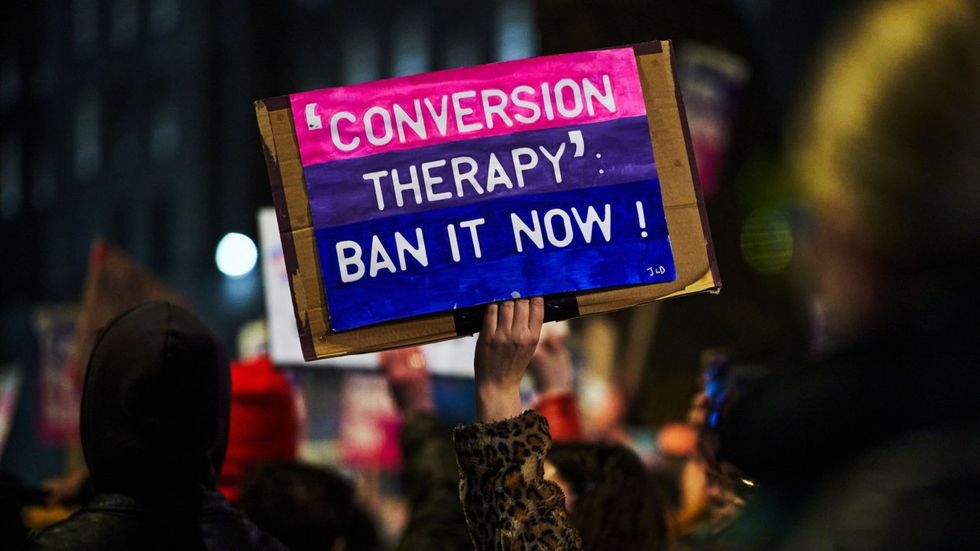
WWW.OUT.COM
Conversion therapy for LGBTQ+ people, long discredited, could make a comeback
This article originally appeared on Stateline , which is part of States Newsroom.Week after week, a teenage Brandon Long sat through counseling sessions that he said framed his identity as a failure.Now an ordained minister in northern Kentucky, Long told Kentucky state lawmakers about the years he spent undergoing therapy designed to rid him of his same-sex attraction.Just imagine yourself being told, session after session, that if you remained as you were, you would be rejected, he said.Long testified in February before a Kentucky House committee against a Republican-sponsored bill that would cancel Democratic Gov. Andy Beshears 2024 executive order that banned a controversial practice known as conversion therapy for minors.Conversion therapy is a catchall term for controversial efforts to change the sexual orientation or gender identity of LGBTQ+ people. Sometimes called reparative therapy, it can range from talk therapy and religious counseling to electrical shocks, pain-inducing aversion therapy and physical isolation.The bill, Long told lawmakers, creates a legal shield for conversion therapy, allowing parents to force their children into a practice condemned by every major medical and mental health organization worldwide.Kentuckys Republican-controlled legislature passed the bill, then overrode the governors veto in March.Conversion therapy has been denounced by major medical organizations including the American Medical Association, American Psychological Association, American Psychiatric Association and the American Academy of Child and Adolescent Psychiatry. They say its ineffective and harmful and puts LGBTQ+ people at risk for depression, substance use, suicide and other mental health issues.More than half of states have banned or restricted the practice for underage patients since California became the first to do so in 2012, according to the Movement Advancement Project, a nonprofit research organization that tracks LGBTQ+-related laws and policies.But political currents are shifting. Conservative majorities in the courts, in state legislatures and at the federal level have reshaped the legal landscape, opening the door for Republican lawmakers and conservative Christian groups to reinstate a practice that has been roundly discredited by the medical community.In March, the U.S. Supreme Court agreed to hear a case challenging Colorados 2019 conversion therapy ban on freedom of speech grounds. The decision marks a change from 2017, when the court refused to hear a challenge to Californias ban, and 2023, when it declined to hear a challenge to Washingtons ban.The high courts decision, which isnt expected until next year, could reverse or solidify conversion therapy bans across the country.Last month, a Virginia court partially struck down the states 2020 law banning conversion therapy for minors, a win for conservative Christian organizations. GOP lawmakers in Michigan have introduced a bill to repeal the states ban. And Missouris Republican attorney general has filed suit to overturn local conversion therapy bans.On the flip side, in Wisconsin, the state Supreme Court cleared the way earlier this year for the state to permanently ban the practice.The world has changedWhile organized attempts to cure homosexuality have been around for centuries, ex-gay groups that promised to change a persons sexual orientation began gaining ground in the 1990s as policy debates arose over same-sex marriage and gay people serving in the military, said Dr. Jack Drescher, a psychiatrist and psychoanalyst in private practice in New York City. He is also a clinical professor of psychiatry at Columbia University whose research has focused on gender and sexuality.But after Massachusetts legalized same-sex marriage in 2004 and more states followed, the influence of conversion therapy proponents waned.As of this year, 23 states and Washington, D.C., prevent licensed health care providers from subjecting minors to conversion therapy, according to an analysis of state laws by the Movement Advancement Project. Four more states restrict the practice, such as by not allowing public funding to go toward conversion therapy services.State laws typically levy fines or discipline the professional licenses of practitioners who try to engage minors in conversion therapy. They dont necessarily prevent clergy or unlicensed counselors from attempting such counseling.The bans are more of a public statement of acceptance of LGBTQ+ people, rather than a commonly used preventive measure, said Drescher.The bans are reinforcements of the belief that if homosexuality is not a mental disorder or disease, theres no reason to pretend you can treat it, and anybody who tries is acting outside the mainstream of science, Drescher told Stateline.The American Medical Association has written model legislation for state lawmakers who want to ban conversion therapy, a reflection of the broad consensus in the medical community that homosexuality and gender nonconformity are not mental illnesses, said R.J. Mills, a representative from the American Medical Association, in a statement to Stateline.In the past, some leading psychiatric and psychological associations were hesitant to support state restrictions because they saw the laws as intrusions into the doctor-patient or therapist-patient relationship, Drescher said.Everybody understands whats at stake now. Dr. Jack Drescher, a psychiatrist and psychoanalyst in New York City whose research focuses on gender and sexualityNow, spurred by Trump administration policies that place new restrictions on LGBTQ+ people and the most conservative U.S. Supreme Court in generations, medical organizations are growing more vocal in their opposition to conversion therapy.The world has changed, Drescher said. Everybody understands whats at stake now.Free speech argumentConservative legal firms have filed lawsuits in states such as Colorado, Michigan and Virginia on behalf of Christian counselors who say the laws prevent them from practicing according to their faith-based values. They say the bans should be repealed so practitioners wont face losing their careers over providing services informed by their faith.A Virginia court last month oversaw a consent decree in which Virginia agreed to not fully enforce its 2020 conversion therapy ban and to allow counselors to engage in talk conversion therapy with minors. The plaintiffs in the case were John and Janet Raymond, state-licensed professional counselors in Virginia who were represented by the Founding Freedoms Law Center, an organization that takes on conservative legal causes.The kind of talk therapy now allowed can involve conversation, prayer and sharing of written materials such as religious scriptures, said Josh Hetzler, the Raymonds attorney, during a public news conference following the court decision.With this court order, every counselor in Virginia will now be able to speak freely, truthfully and candidly with clients who are seeking to have those critical conversations about their identity, and to hear faith-based insights from trusted professionals, he said.Conservative legislators also are citing their Christian faith in their attempts to roll back state bans.Michigan state Rep. Josh Schriver, a Republican, filed a package of bills last month aimed at repealing a handful of what he calls anti-Christ laws, including Michigans 2023 ban on conversion therapy for youth.A legislative aide said Schriver wasnt available for an interview, and instead referred Stateline to the recent Substack post he emailed to his constituents.As legislators, were duty-bound to remove statutes that overstep the authority given by our state and federal Constitutions, Schriver said in the post.Long, the Kentucky minister, said the bans are needed because no one enters conversion therapy willingly.The only reason a child would go through it is because a trusted authority in their life a parent, a pastor or a therapist has told them that they are broken and need to be fixed.At least five states have a law or policy prohibiting or deterring local-level ordinances that aim to protect youth from conversion therapy.Some states without such laws are going after municipalities that have banned conversion therapy.Missouri Republican Attorney General Andrew Bailey in February sued Jackson County, Missouri, home to Kansas City, challenging the countys 2023 ordinance and Kansas Citys 2019 ordinance, both of which ban licensed counselors from engaging in conversion therapy with minors.Our children have a right to therapy that allows for honest, unrestricted conversations, free from transgender indoctrination, Bailey said in a statement in February. He called the ordinances a dangerous overreach that violate free speech and religious liberty rights.A Republican lossIn at least one state, conservatives have hit a legal roadblock.In Wisconsin, Democratic Gov. Tony Evers administration has been trying since 2020 to enact a statewide conversion therapy ban proposed by the state agency that oversees provider licensing.But the ban has been blocked twice by a Republican-controlled legislative committee.Evers administration sued.The Wisconsin Supreme Court sided with Evers last month, ruling that the state legislative committee was overreaching and couldnt block the rule.Stateline reporter Anna Claire Vollers can be reached at avollers@stateline.org.Stateline is part of States Newsroom, a nonprofit news network supported by grants and a coalition of donors as a 501c(3) public charity. Stateline maintains editorial independence. Contact Editor Scott S. Greenberger for questions: info@stateline.org.
0 Comments
0 Shares
91 Views
0 Reviews



